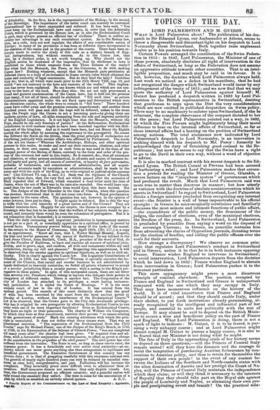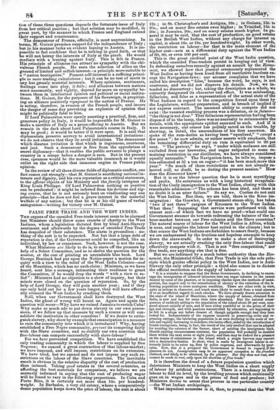T OPICS OF THE DAY.
LORD PALMERSTON AND M. GUIZOT.
WHAT is Lord Palmerston about ? The publication of his des- patch to Sir Edmund Lyons, our Ambassador at Athens, seems to throw a disagreeable and discordant light on his despatch to Lord Normanby about Switzerland. Both together raise unpleasant doubts as to his position towards Italy. Certain Powers arranged the constitution of the Swiss Federa- tion in 1815 : in 1847, Lord Palmerston, the Minister of one of those powers, absolutely disclaims all right of intervention in the affairs of Switzerland, so long as the Federation does not assume an aggressive attitude towards other countries. That is an intel- ligible proposition, and much may be said in ita favour. It is not, however, the doctrine which Lord Palmerston always held. Last week we noticed as a defect in his manifesto, that he had not recognized the danger which Switzerland would incur by any infringement of the treaty of 1815 ; and we now find that we may quote the authority of Lord Palmerston . against himself: M. Guizot has produced a despatch written in 1832 by Lord Pal- merston to the British representative in Switzerland, desiring that gentleman to urge upon the Diet the very considerations which are now omitted in published despatches on Swiss policy. There may be no machinery to enforce upon Switzerland, if she be reluctant, the complete observance of the compact dictated to her at the peace; but Lord Palmerston pointed out a way, in 1832, by which the Five Powers might legitimately bring their moral influence to bear on the internal affairs of Switzerland, so far as those internal affairs had a bearing on the position of Switzerland among nations. The total abstinence now indicated by Lord Palmerston's despatch to Lord Normanby, is an innovation in striking discord with his despatch to Mr. Percy : formerly be acknowledged the duty of furnishing good counsel to the Re- publicans ; but now he seems to say that the Swiss have a Tifht to go to the Devil in their own way, without a word of objection or advice.
It is also in marked contrast with his recent despatch to Sir Ed- mund Lyons. The British Consul at Prevesa had been accused of harbouring a rebel • and Lord Palmerston makes that accusa- tion a pretext for reading the Minister of Greece, Glarakist a severe lecture on the "iniquitous system" of government which had produced the revolt. Much that Lord Palmerston said was more true in matter than decorous in manner ; but how utterly at variance with the doctrine of absolute nonintervention which he asserts in Switzerland I In regard to Switzerland, Lord Palmerston thinks a foreign minister precluded from recognizing any internal event—the frontier is a wall of brass impenetrable to his official eyesight : in Greece he microscopically scrutinizes and familiarly discusses the most minute and intimate functions of public affairs, —the expenditure of the public money, the demeanour of the judges, the conduct of elections, even of the municipal elections, the freedom of the press, &c. In Switzerland, Lord Palmerston is precluded by punctilio from saying a word on the disposal of the sovereign Cantons; in Greece, no punctilio restrains him from advocating the claims of Opposition journals, dictating terms for the election of beadles, and calling the public officers over the coals for their accounts.
How strange a discrepancy I We observe no common prin- ciple that regulates Lord Palmerston's conduct in Switzerland and in Greece, unless it be that he is in both instances opposing France. France wishes England to intervene in Switzerland; to avoid intervention, Lord Palmerston departs from the doctrine which he laid down in 1832: France wishes England to abstain from intervention in Greece; Lord Palmerston pushes it to the minutest particulars. This mere oppugnancy might prove a most disastrous principle of conduct elsewhere. The position occupied by France and England in Switzerland and Greece is unimportant compared with the one which they may occupy in Italy. That may have momentous influence on the history of the world. It is of vital importance that France and England should be of accord ; and that they should enable Italy, under their shelter, to put forth institutions already germinating, al- ready recognized by the intelligent and influential part of her people, and essential to unite her politically with the rest of Europe. It may almost be said to depend on the British Minis- ter to secure a wise and beneficent policy on the part of France and England. What Lord Palmerston is doing, there is not a spark of light to indicate : M. Guizot, it is to be feared, is cur.. suing a very unhappy course ; and as Lord Palmerston might almost compel M. Guizot to pursue a happy course, it is also to be feared that our Minister is not doing what he might.
The fate of Italy in the approaching crisis of her history seems to depend on three questions,—will the Princes of Central Italy remain united? will they have the firmness and the courage to resist the temptation of purchasing Austrian forbearance by con- cessions to Austrian policy, and thus to retain for themselves the support of their own people? in the event of any contest be- tween the Wilms of the Southern and North-eastern states with the alien domination of Austria and her protégé the Court of Na- ples, will the Princes of Central Italy maintain the independence which they claim; or will they think it necessary to the interests of Royalty that they should take part on the Royal side against the people of Lombardy and Naples, so alienating their own peo- ple and precipitating revolt and tumult ? On the practical solu-
tion of these.three questions depends the fortunate issue of Italy from her critical position ; but that solution may be modified, in great part, by the manner in which France and England extend their support and countenance.
The demeanour of France, officially, is most unpromising. In terms, M. Guizot promises support for the independence of Italy ; but in his manner lurks an evident leaning to Austria. It is im- possible to feel confident that he is talking in good faith, or that be will not betray the interests of Italy at the pinch. He would mediate with a leaning against Italy. This is felt in France. His principle of alliances can attract no sympathy with the chi- valrous French people. He rests the selection of allies on the ground of limited and selfish interest—a principle more suitable to -a "nation boutiquiere." Present self-interest is a sufficing princi- -ple in mere trading calculations ; but it can be no test of merit in any but grossly material interests. Where opinions, sentiments, feelings come into play, it fails; and alliances between nations must necessarily, and rightly, depend far more on sympathy be- tween them in intellectual opinion and political or social institu- tions. M. Guizot, for the purposes of his Sovereign, is propitiat- ing an alliance positively repugnant to the nation of France. He is acting, therefore, in evasion of the French people, and incurs the danger of some day provoking an explosion of opinion that might be politically fatal to him. If Lord Palmerston were openly asserting a practical, firm, and generous policy in Italy, it would be impossible for M. Guizot to make a sacrifice of Italy as a peace-offering to Austria. But we remain in the dark about Lord Palmerston's course in Italy. It may be good ; it would be better if it were open. It is said that diplomatists preserve secrecy to avoid international irritations : we do not observe that they do avoid irritations. The demeanour which disarms irritation is that which is ingenuous, courteous, and just. Such a demeanour is free from the opprobrium of secret diplomacy—that it enables the public servants to plunge a country in a scrape before a danger is seen. But in the present case, openness would be the more valuable inasmuch as it would enlist on the right side that immense engine in France public opinion. In the review of all these diverse fields of diplomatic conflict, one fact comes out strongly—that M. Guizot is sacrificing national in- terests and dignity, and his own reputation as a critical statesman, to the official objects of his Ministry and the family intrigues of King Louis Philippe. Of Lord Palmerston nothing so positive can be predicated : it might be inferred from his devious and zig- zag course, that he is not seriously bent on vindicating any one principle—that he does not feel a grave interest in the material welfare of any nation ; but that he is at his old game of verbal antagonism—writing for victory over M. Guizot.



























 Previous page
Previous page